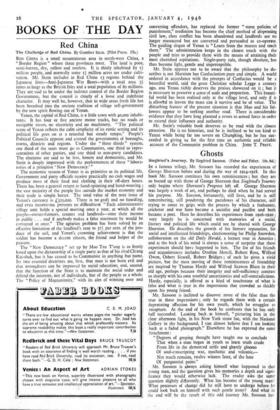BOOKS OF THE DAY
Red China
The Challenge of Red China. By Gunther Stein. (Pilot Press. 15s.) RED CHINA is a small mountainous area in north-west China, a " Border Region " where three provinces meet. The land is poor, semi-barren, dry, yellow and treeless. It is thinly inhabited by ri million people, and normally some 11 million acres are under culti- vation. Mr. Stein includes in Red China 13 regions behind the Japanese lines—Anti-Japanese War Bases—with a total area 31 times as large as the British Isles and a total population of 8o millions. They are said to be under the indirect control of the Border Region Government, but the control is clearly of a loose and indefinite character. It may well be, however,• that in wide areas fresh life has been breathed into the ancient tradition of village self-government by the new spirit flowing out of Yenan.
Yenan, the capital of Red China, is a little town with 40,000 inhabi- tants. It has four or five ancient motor tracks, but no roads or navigable rivers, no electricity and no machinery. " The political scene of Yenan reflects the calm simplicity of its rustic setting and its political life goes on at a retarded but steady tempo." People's Political Councils appoint and control the governments of boroughs, towns, districts and regions. Under the " three thirds " system, one third of the seats must go to Communists, one third to repre- sentatives of other parties, and one third to non-party candidates. The elections are said to be free, honest and democratic, and Mr. Stein is deeply impressed with the performances of these " labora- tories of a primitive ' New Democracy.'-"
The economic system of Yenan is as primitive as its political life. Government and party officials receive practically no cash wages and produce most of their food and clothing in their off-duty hours. There has been a general return to hand-spinning and hand-weaving ; the vast majority of the people live outside the market economy and their trade is simple barter. The total value of the note issue of Yenan's currency is L325,000. There is no graft and no hoarding, and even income-tax presents no difficultiesi " Each administrative village unit holds a special meeting once a year, at which all the people—owner-farmers, tenants and landlords—state their, income in public . . and if anybody makes a false statement he would be corrected at once." The agrarian problem has been solved by an effective limitation of the landlord's rent to 371 per cent. of the pro- duce of the soil, and Yenan's .crowning achievement is that the soldier has become a decent citizen, the friend and helper of the peasant. The " New Democracy " set up by Mao Tzu T'ung is as firmly based upon the dictatorship of a single party as that of his rival Chiang Kai-shek, but it has ceased to be Communist in anything but name. Its two essential doctrines are, first, that man is not born evil and that wrongdoers can be improved by social education; and, second, that the function of the State is to maintain the social order and defend the interests, not of individuals, but of the people as a whole. The " Policy of Magnanimity," with its aim of winning over and converting offenders, has replaced the former " stern policies of punishment," mediation 'has become the chief method of dispensing civil law, class conflict has been abandoned and landlords are no longer massacred but are converted and persuaded to co-operate. The guiding slogan of Yenan is "Learn from the masses and teach them." The administration keeps in the closest touch with the people and tries to provide them with the means of attaining their most cherished aspirations. Single-party rule, though absolute, has thus become light, gentle and imperceptible.
Mr. Stein appears not to be aware that the philosophy he de- scribes is not Marxism but Confucianism pure and simple. A world ordered in accordance with the precepts of Confucius-would be a beautiful world, said the great Christian scholar Legge a century ago, and Yenan richly deserves the praises showered on it ; but it is necessary to preserve a sense of scale and proportion. This beauti- ful world has been realised only at the village level, and only if it is allowtd to leaven the mass can it survive and be of value. The disturbing feature of the present situation is that Mao and his fol- lowers appear to be seeking another road. There is considerable evidence that they have long planned a resort to armed force in order to extend their influence and authority.
Mr. Stein's valuable book deserves to be read with the closest attention. He is no historian, and he is inclined to be too kind to Yenan while being far too severe on Chungking, but he has suc- ceeded in giving us for the first time an authentic and reliable account of the Communist problem in China. JOHN T. PnArr.































 Previous page
Previous page